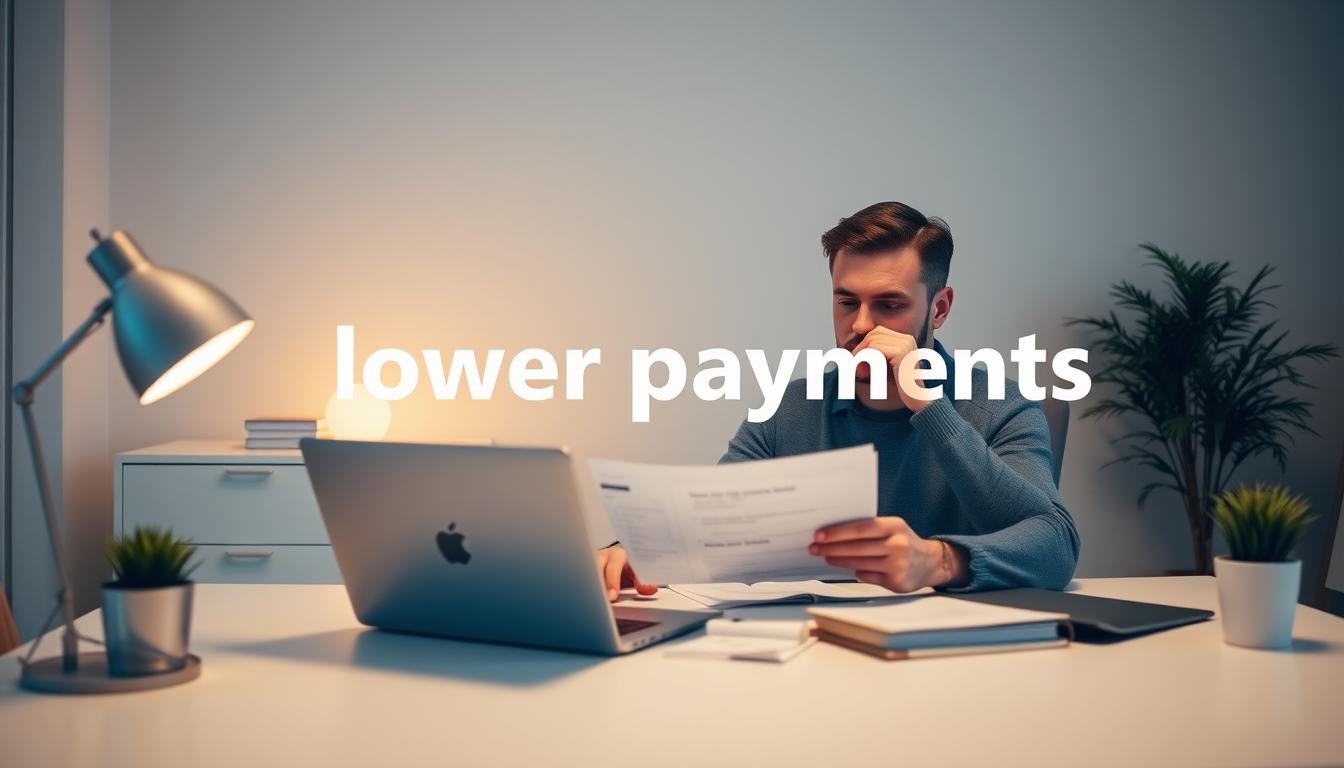Consolidation Loans: Streamline Your Finances
Did you know managing many debts is like juggling balls? Simplifying your financial obligations is key to financial stability.
By combining multiple debts into one loan, known as debt consolidation, we can make things easier. This strategy reduces the number of monthly payments. It might also lower our interest rates, making it simpler to manage our finances.
Using this method, we can make our finances more organized. It’s a big step toward becoming debt-free.
Key Takeaways
- Simplifying multiple debts into one loan can ease financial management.
- Debt consolidation can potentially lower overall interest rates.
- Reducing multiple payments to one can decrease financial stress.
- Consolidation can make tracking finances easier.
- This strategy can help in achieving financial stability.
Understanding Consolidation Loans
Loan consolidation can make managing your money easier. It combines several debts into one, often with a lower interest rate. This means you only have to make one monthly payment, which can save you money.
What Are Consolidation Loans?
A consolidation loan helps you pay off many debts with one loan. This can include credit card balances, personal loans, and more. It simplifies your financial life by combining all your debts into one.
How Do They Work?
Consolidation loans work by paying off your existing debts with a new loan. This new loan usually has a lower interest rate and a longer repayment period. For example, if you have high-interest credit cards, you can consolidate them into a single loan with a lower rate.
Who Can Benefit from Them?
People with multiple debts, high interest rates, or trouble making payments can benefit. This includes those with credit card debt, personal loans, or other debts. Consolidating can make managing your money easier and lower your monthly payments.
| Feature | Consolidation Loan | Multiple Debts |
|---|---|---|
| Interest Rate | Often Lower | Variable, often Higher |
| Monthly Payments | Single Payment | Multiple Payments |
| Repayment Term | Can be Longer | Varies by Debt |
Types of Consolidation Loans
Starting our journey to financial freedom means learning about different consolidation loans. These loans are not the same for everyone. They are made to fit various financial needs and situations. Knowing our options helps us make smart choices for our money.
Secured vs. Unsecured Loans
There are two main types of consolidation loans: secured and unsecured. Secured loans need something valuable like a house or car as collateral. This makes lenders feel safer, often leading to lower interest rates. On the other hand, unsecured loans don’t need collateral, making them riskier for lenders and possibly more costly for us.
When deciding between secured and unsecured loans, we must think about our financial situation and the risks. Secured loans can risk our assets if we can’t pay back the loan. Unsecured loans might have higher interest rates or stricter rules to follow.
Personal Loans for Consolidation
Personal loans are a common choice for debt consolidation. They are usually unsecured, making them easier to get. Personal loans often have fixed interest rates and repayment terms, helping us plan our budget better.
When looking at personal loans for consolidation, it’s important to compare rates and terms from different lenders. This way, we can find the best consolidation loans and save money on interest and fees over time.
Debt Management Plans
A debt management plan (DMP) is another way to manage debt, but it’s not a loan. It involves working with a credit counseling agency to create a plan to pay off debts. The agency might talk to creditors to lower interest rates or fees, helping us become debt-free easier.
To show the differences between secured and unsecured consolidation loans, here’s a comparison:
| Loan Type | Collateral Required | Interest Rate | Risk Level |
|---|---|---|---|
| Secured Loan | Yes | Lower | Higher risk of losing collateral |
| Unsecured Loan | No | Higher | Higher interest rates, stricter criteria |
Understanding the different types of consolidation loans helps us make better choices for our finances. Whether we choose a secured loan, an unsecured loan, or a debt management plan, the goal is to pick what fits our financial goals and abilities.
Benefits of Consolidation Loans
Consolidation loans offer many benefits, like easier payments and a chance to boost your credit score. By combining several debts into one, you get a single interest rate and payment date. This makes managing your finances simpler.
Let’s dive into the main advantages.
Simplified Payments
One big plus is the ease of making payments. Instead of dealing with many due dates and amounts, you only have one to remember each month.
This can help avoid missed payments, which can hurt your credit score. The National Foundation for Credit Counseling found that consolidating debt helps people pay on time more often.
“Consolidating debt can simplify your financial life and reduce the stress associated with managing multiple debts.”
Lower Interest Rates
Another great benefit is the chance for lower interest rates. If you have debts with high rates, combining them into one with a lower rate can save you money.
For example, let’s look at a comparison:
| Debt Type | Original Interest Rate | Consolidated Interest Rate |
|---|---|---|
| Credit Card A | 20% | 12% |
| Credit Card B | 22% | |
| Personal Loan | 15% |
By getting a single loan at 12%, you could save a lot of money on interest over time.
Improved Credit Score Potential
Consolidating debts can also boost your credit score. By paying off more debts and making timely payments, you show lenders you’re responsible.
- Reducing debt-to-income ratio
- Making timely payments
- Avoiding new credit inquiries
These actions can lead to a better credit score. A higher score means you might qualify for better loan terms and lower rates later.
Potential Drawbacks
Consolidation loans can make our finances simpler, but they also have downsides. It’s important to consider these before choosing a consolidation loan.
One big drawback is the fees and charges. Lenders might ask for origination fees, balance transfer fees, or late payment fees. These can increase our debt. For example, a 2% origination fee on a $10,000 loan is $200, taken from the loan amount we get.
Fees and Charges
When looking at personal loan consolidation, remember all the costs involved. Here are some fees to watch out for:
- Origination fees: A percentage of the loan amount, taken upfront.
- Late payment fees: Fees for missing payment deadlines.
- Prepayment penalties: Fees for paying off the loan early.
Knowing these fees helps us decide if a consolidation loan is good for us.
Impact on Credit Score
Consolidating debts can affect our credit score in different ways. Applying for a new loan might lower our score due to a hard inquiry. But, making timely payments can improve our score over time.
Closing credit accounts after consolidating can also impact our score. It affects our credit utilization ratio and age, which can lower our score.
Debt Cycle Risks
Another risk is falling into a debt cycle with consolidation loans. If we’re not careful, we might start new debts on our credit cards. This makes it hard to get out of debt.
To avoid this, we need a budget and to stick to it. This way, we don’t overspend and get into new debt. Experts say, “The key to managing a consolidation loan is to change our spending habits that led to debt.”
By knowing these risks and taking steps to avoid them, we can use consolidation loans wisely. This helps us achieve a stable financial future.
Eligibility Requirements
Knowing what it takes to get a consolidation loan is key. Lenders look at many things to see if you qualify for a loan consolidation program.
Credit Score Considerations
Your credit score matters a lot for consolidation loans. A high score shows you’ve handled money well in the past. Most lenders want a score of 650 or better. But, some lenders help those with lower scores, but they charge more interest.
Income Verification
Lenders want to make sure you can pay back the loan. They check your job and how much you make. You might need to show pay stubs, W-2s, or tax returns. If you’re self-employed, you might have to give more financial info for your loan consolidation application.
Debt-to-Income Ratio
The debt-to-income (DTI) ratio is also important. It shows how much of your income goes to debt. Lenders like a DTI of 36% or less. A lower DTI means you can handle more debt and pay off the consolidation loan.
By knowing and meeting these requirements, you can get a consolidation loan. This can make managing your money easier.
How to Apply for a Consolidation Loan
To apply for a consolidation loan, we need to know the steps and what to prepare. The process has several key stages. These help make our debt easier to manage and improve our finances.
Steps to Get Started
The first step is to check our financial situation. We should list all our debts, like credit cards and personal loans. It’s also important to check our credit score, as it affects the interest rate we get.
For more information, we can visit Experian’s guide on debt consolidation loans.
After understanding our debts and credit score, we can look for lenders. It’s key to compare different lenders. We should find ones with good interest rates, flexible terms, and low fees.
Documentation Needed
When applying, we need to provide certain documents. These include proof of income, identification, and a list of our debts. Having these ready can make the process faster.
Some lenders might ask for more, like bank statements or proof of residence. It’s wise to ask the lender what they need ahead of time.

Choosing the Right Lender
Choosing the right lender is crucial. We should look for ones that are reputable and offer good terms. Reading reviews and checking ratings can help us understand their reliability and service.
Before signing, we should carefully review the loan agreement. We need to understand all the terms, including the interest rate, repayment period, and any fees.
By following these steps and being prepared, we can successfully apply for a consolidation loan. This is the first step towards simplifying our finances.
Comparing Lenders
When you’re looking to consolidate debt, comparing lenders is key. It can greatly impact your financial health. You need to look at different lenders carefully to find the best deal.
Interest Rates and Terms
The interest rate and terms of a loan are very important. Lower interest rates mean you pay less over time. Always compare the Annual Percentage Rate (APR) from different lenders. This rate includes the interest and any extra fees.
| Lender | APR | Loan Term |
|---|---|---|
| Lender A | 6.99% | 5 years |
| Lender B | 7.99% | 7 years |
| Lender C | 6.49% | 5 years |
Customer Reviews and Reputation
It’s important to know about a lender’s reputation and how customers feel. Customer reviews can tell you a lot. Look at reviews on different sites to get a full picture.
“I’ve been very satisfied with my consolidation loan from Lender C. The process was straightforward, and the customer service was responsive to my queries.”
Fees and Hidden Costs
Don’t just look at the interest rate. Understand all fees associated with the loan. This includes origination fees, late fees, and prepayment penalties. These can increase the total cost of your loan. Always read the loan agreement carefully and ask about any hidden costs.
By comparing lenders based on interest rates, customer reviews, and fees, we can make a smart choice. This choice will help us consolidate debt effectively and meet our financial goals.
Making the Most of a Consolidation Loan
After you’ve consolidated your debts, it’s key to use smart strategies. This can make your finances easier to handle. But, you must manage it well to see long-term gains.
Budgeting After Consolidation
Creating a budget that works is crucial after you’ve consolidated your debts. Start by tracking your income and expenses. This helps you see where your money goes.
Then, focus on spending wisely. Make sure you have enough money to pay back your consolidation loan. The 50/30/20 rule can help: 50% for needs, 30% for wants, and 20% for savings and debt.

Setting Up Automatic Payments
Setting up automatic payments is a smart move. It keeps you from missing payments and avoids late fees. It also helps your credit score by showing you’re reliable with payments.
Automating payments also lowers the chance of getting into new debt. You’re less likely to miss payments or spend more than you should.
Seeking Financial Counseling
Getting help from a financial advisor can be very helpful. They can give you advice that fits your specific situation. This helps you make better financial choices.
| Strategy | Benefits | Actions |
|---|---|---|
| Budgeting | Simplifies financial management, reduces overspending | Create a budget plan, track expenses, adjust spending habits |
| Automatic Payments | Avoids late fees, improves credit score | Set up automatic loan payments, monitor account balances |
| Financial Counseling | Provides personalized financial guidance, helps in making informed decisions | Seek a financial advisor, discuss financial goals and challenges |
Using these strategies can help you get the most out of your consolidation loan. It simplifies your finances and helps you achieve financial stability. Whether you’re dealing with credit card debt or a personal loan consolidation, staying committed to your plan is key.
Conclusion: Is a Consolidation Loan Right for Us?
Managing multiple debts can be tough. A consolidation loan might help. But, it depends on our financial situation and goals.
Assessing Financial Situation
To see if a consolidation loan works for us, we need to check our finances. We should look at our income, expenses, debts, and credit score. This helps us understand where we stand financially.
Making Informed Decisions
Choosing a consolidation loan means weighing its pros and cons. Benefits include easier payments and lower interest rates. But, there might be fees and charges. It’s smart to compare different lenders, like banks and credit unions, to find the best loan for us.
Taking the Next Steps
If we decide a consolidation loan is for us, we can apply for it. We should set up automatic payments and consider financial counseling if needed. This way, we can manage our debt better and aim for a stable financial future.









